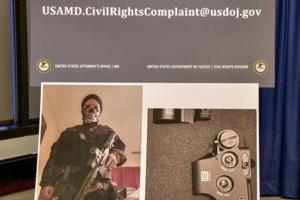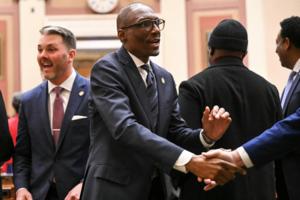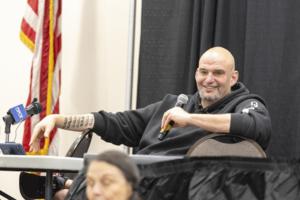Current News
/ArcaMax
News briefs
Trump directs Bureau of Prisons to rebuild and reopen Alcatraz. Can he do that?
President Donald Trump said Sunday that he was ordering the FBI to reopen the Alcatraz Federal Penitentiary, the historic prison on an island off of San Francisco that has been closed since 1963.
“REBUILD, AND OPEN ALCATRAZ!” he wrote in a post on Truth Social....Read more

'It's in a chaotic state': Virginia food banks feel the effects of federal funding cuts
Bob Latvis knows there may often be changes in federal funding for food banks with any new administration. This time though, many Virginia food banks are in a state of limbo as they wait for federal support.
The first Trump administration provided trade mitigations that increased available food for food banks, and the Biden administration ...Read more

Hegseth says 'lean and mean' military requires cutting officers
WASHINGTON — Defense Secretary Pete Hegseth ordered a reduction of the U.S. military’s highest-ranking officers — potentially setting up a clash with Congress, which must approve any such adjustments.
In a memo released Monday, Hegseth called for slashing 20% of four-star positions in the active-duty military, 20% of all general officers ...Read more

Alberta's Smith plans talks with Carney, says separation vote possible
TORONTO — Alberta Premier Danielle Smith said she’s appointing a group to negotiate with the Canadian government on removing laws that restrict energy production, adding that a referendum on the province separating from Canada may be on the ballot as soon as next year.
Alberta will seek an agreement that guarantees energy transportation ...Read more

No new trial for white supremacist convicted in plot to disrupt Baltimore power grid
BALTIMORE — A federal judge rejected a white supremacist’s request to be tried again after the Florida resident was convicted of a conspiracy charge stemming from a plot to disrupt the Baltimore-area power grid.
Lawyers for Brandon Clint Russell, 29, had filed the motion for a new trial after the Department of Justice revealed additional ...Read more

Nearly quarter of people on long-acting opioids develop addiction
More than one in five people prescribed extended-release painkillers such as OxyContin developed an addiction within a year, according to a newly released study mandated by the U.S. Food and Drug Administration.
The study, repeatedly delayed by more than a decade and released Monday, revealed a far higher percentage of pain patients addicted ...Read more

Federal judge orders North Carolina to certify Riggs as winner in Supreme Court election
RALEIGH, N.C. — In a ruling that could put an end to nearly six months of legal battles over North Carolina’s contested Supreme Court election, a federal judge on Monday ruled against the Republican candidate’s effort to overturn his narrow loss.
Chief U.S. District Judge Richard E. Myers, an appointee of President Donald Trump, ruled ...Read more

New York Times Leads Pulitzers With 4
NEW YORK — The New York Times won four Pulitzer Prizes, including the Explanatory Reporting award for its examination of the failures and missteps made by the United States in Afghanistan.
Columbia University’s Graduate School of Journalism announced the 109th annual Pulitzer Prizes Monday in New York. The awards honored the best reporting ...Read more

EPA tells hundreds of Research Triangle Park scientists to reapply for jobs under Trump office cut
The Environmental Protection Agency is reorganizing its science research office in a move expected to impact, and likely eliminate, several hundred jobs at the agency’s Research Triangle Park campus in North Carolina.
During a virtual meeting Friday, EPA leaders encouraged staff within the Office of Research and Development to reapply for ...Read more

Teen curfew vote delayed, alderman praises Mayor Brandon Johnson's listening efforts
CHICAGO — Aldermen once again delayed an expected vote Monday on whether Chicago police should get the power to implement “snap” curfews to try to force large youth gatherings to break up.
The City Council’s Public Safety Committee had been expected to vote on the measure at its afternoon meeting, but Ald. Brian Hopkins said early in ...Read more

Trump blocks Harvard from new research funding in latest blow
WASHINGTON — The Trump administration is declaring Harvard University ineligible for new research grants from the federal government in the latest escalation between the White House and the Ivy League school.
Education Secretary Linda McMahon will send the university a letter warning that access to additional federal funding would not be ...Read more

US space-based missile defense could cost $542 billion, CBO says
WASHINGTON — The United States may need to spend up to $542 billion over 20 years to develop and launch a network of space-based interceptors, the Congressional Budget Office said, putting a rough cost estimate on an unproven part of President Donald Trump’s proposed “Golden Dome” defense system.
The network for space-based interceptors...Read more

US Rep. Jan Schakowsky, Illinois congresswoman since 1999, announces she will not seek another term next year
CHICAGO — U.S. Rep. Jan Schakowsky, who represented Chicago's north suburbs in Congress for more than 2 1/2 decades, announced Monday that she will not seek a 15th term next year.
“This is the official — that I’m not going to run again for Congress,” Schakowsky said to a crowd of about 1,000 people attending an Ultimate Women’s ...Read more

Karen Read retrial hits Day 9 with the fateful night in question
DEDHAM, Mass. — The Canton Fire Department paramedic who initially reported hearing Karen Read say “I hit him” while nearby John O’Keefe, dead or dying on a front lawn, took the stand on the ninth day of trial.
Read, 45, of Mansfield, faces charges including second-degree murder in the death of O’Keefe, a Boston police officer and her...Read more

Ethics panel deadlocks on complaint against Minnesota Senate president
MINNEAPOLIS — An ethics complaint Republicans filed against Minnesota Senate President Bobby Joe Champion, DFL-Minneapolis, stalled Monday after a legislative ethics panel failed to reach consensus on how to proceed.
The two Democratic-Farmer-Labor and two Republican members of the Senate Subcommittee on Ethics deadlocked on whether there was...Read more

A viral video shows Sen. John Fetterman getting into an argument with airplane crew on flight to Pittsburgh
Video from earlier this year shows Sen. John Fetterman getting in an argument with an airline crew over the proper way to wear his seatbelt on a flight to Pittsburgh.
The video went viral after New York Magazine’s profile of Pennsylvania’s Democratic senator and his mental well-being, per staffers, last week in which the tense moment is ...Read more
Green fireball spotted over western skies. 'Never seen anything quite like this'
Hundreds of people reported seeing a fireball over several western U.S. states, especially over Utah, where it was exceptionally large, bright and green.
Reports poured into the American Meteor Society from Utah, Idaho, Wyoming, Montana, Colorado, and even Alberta, Canada, on Saturday, May 3 and into Sunday, May 4.
Videos attached to the May ...Read more

NIAA loses 2 California high schools because of new transgender policy
Two California high schools are dropping out of the Nevada Interscholastic Activities Association, citing the NIAA’s new policy on transgender athletes.
Northern schools Truckee and North Tahoe announced Friday they will leave the NIAA after the school year and join the California Interscholastic Federation beginning in the 2025-26 school ...Read more

3 dead after suspected smuggling boat capsizes off Del Mar in San Diego County
SAN DIEGO — A search was underway early Monday after a suspected smuggling boat capsized off Del Mar, killing three people.
Early reports indicated nine people were missing from the boat, while four survivors were located.
“Potentially nine more individuals are unaccounted for,” said Coast Guard spokesperson Adam Stanton. “That nine ...Read more

Analysis: Secretary Rubio defies Sen. Rubio by declaring foreign policy 'belongs' to Trump
WASHINGTON — Secretary of State Marco Rubio’s declaration last week that foreign policy “belongs” solely to the Executive Office of the President is undermined by the statements and legislation of a certain former senator: Marco Rubio of Florida.
Rubio’s comment about flouting a federal judge’s order was merely the latest plank on a...Read more
Popular Stories
- AG Dana Nessel drops charges against group arrested in University of Michigan pro-Palestinian camps
- US Rep. Jan Schakowsky, Illinois congresswoman since 1999, announces she will not seek another term next year
- Karen Read retrial hits Day 9 with the fateful night in question
- Coalition of states sues to block Trump administration cuts to health department
- Trump administration offers $1,000 to immigrants who return home voluntarily





